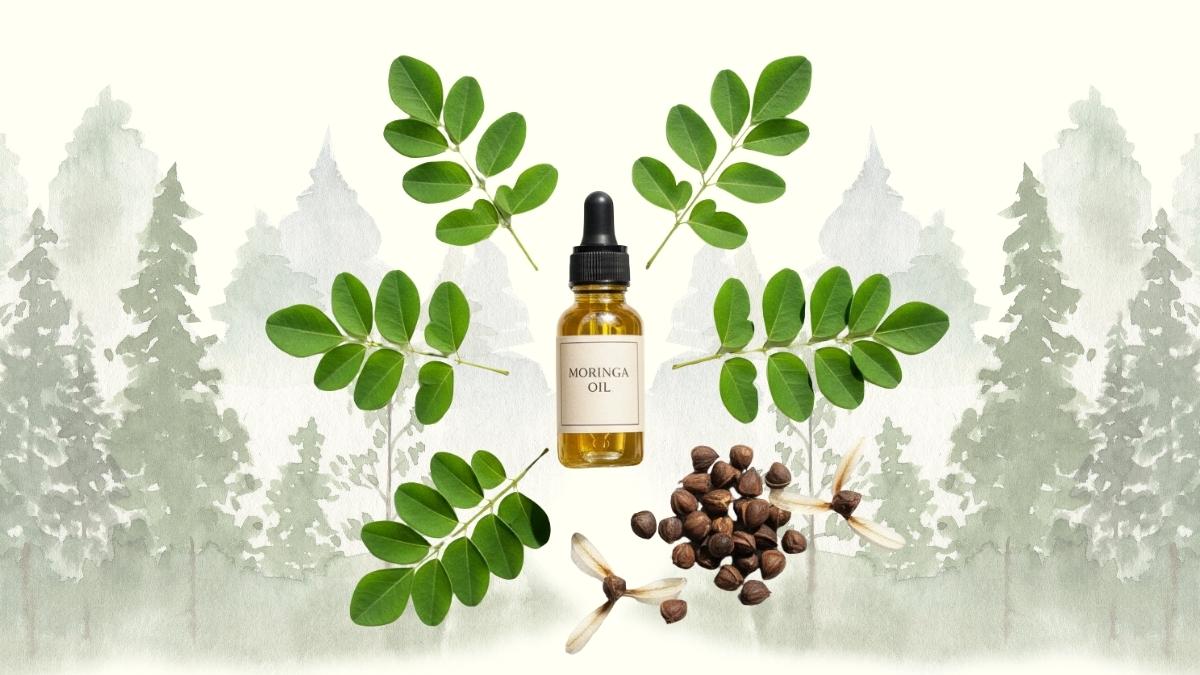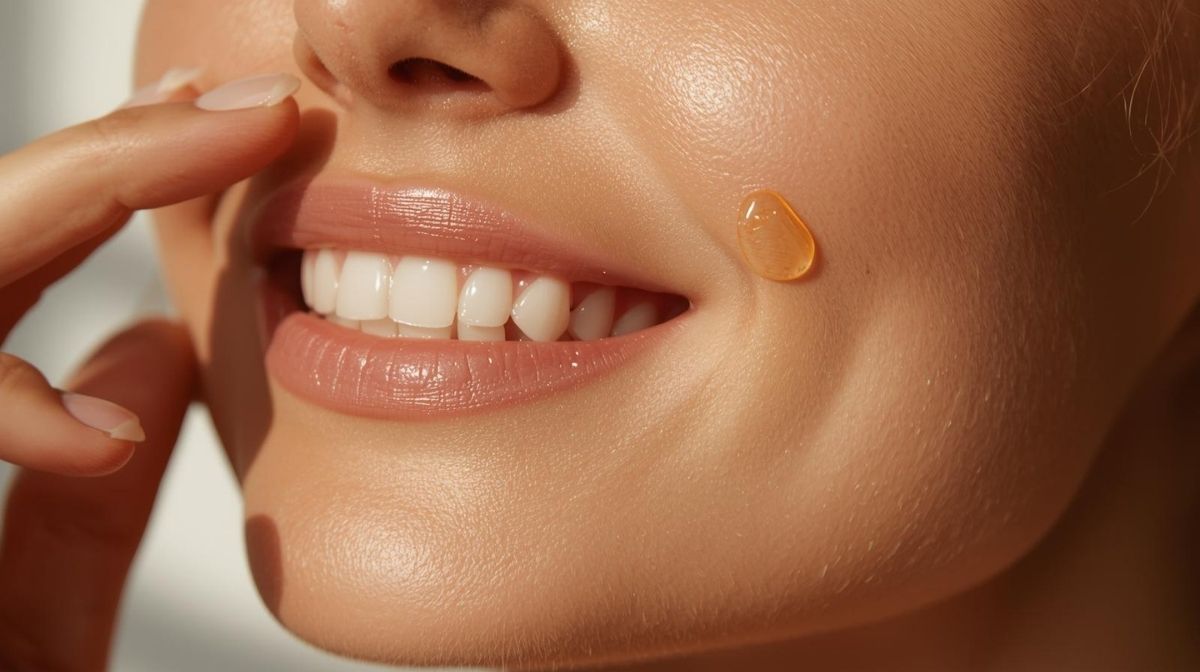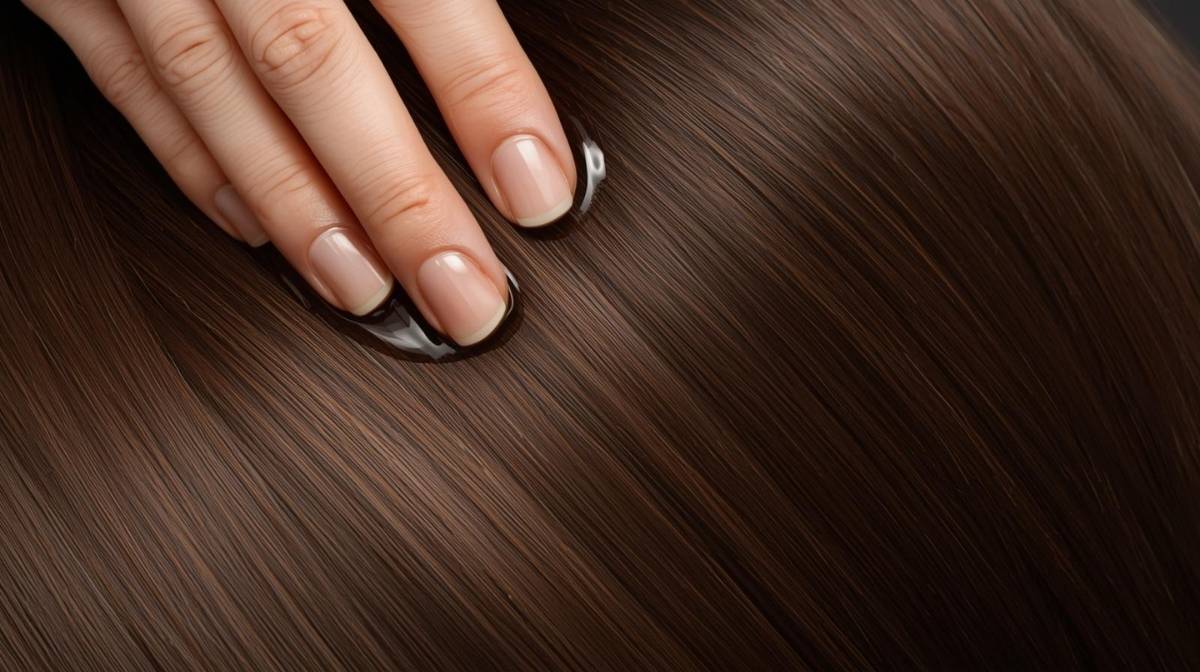The Real Moringa Oil Benefits: Your Ultimate
Research-Backed Guide to Glowing Skin & Strong Hair ✨
You’ve seen it popping up everywhere, haven't you? Moringa oil. It’s in serums, it’s on social media, and it’s being called the next big "miracle" ingredient. But if you're anything like me, you're probably wondering: what are the real moringa oil benefits? Is there any actual science to back it up, or is it just marketing hype?
As a PhD student in agriculture who grew up with my hands in the soil on our family farm, I've learned that some pretty amazing research usually backs nature's best gifts. My goal here is to be your trusted friend, cut through the noise, and share what my research—and my hands-on experience—has taught me about this incredible oil. We're going to look at what's actually inside that bottle and how it can truly work for your skin and hair.
Key Takeaways: Science-Backed Benefits of Moringa Oil
- 💧 Deep Barrier Repair: Rich in Oleic Acid, it mimics your skin's natural lipids to strengthen the hydrolipidic film, clinically proven to improve hydration by nearly 50%.
- 🌿 Acne & Sebum Control: Its non-comedogenic and antibacterial nature helps balance oil production, reducing sebum by up to 25% while soothing inflammation.
- ✨ Keratin Support for Hair: Packed with amino acids and Behenic acid, it smooths the hair cuticle to reduce frizz and provides the building blocks for stronger strands.
- 🛡️ Best Usage Practices: Always apply to damp skin or hair to lock in moisture, and ensure you buy cold-pressed, unrefined oil in dark glass bottles to preserve antioxidants.
The Science Behind the "Miracle" 🌱
What's Actually in Moringa Oil?
Before we can talk about benefits, we have to talk about what’s inside. Think of it like farming: you can't expect a healthy plant without knowing what's in the soil. The same goes for skincare. The magic of moringa oil isn't magic at all; it's biochemistry.
 Moringa seed oil is uniquely stable due to its high Oleic Acid content, allowing it to preserve its antioxidants and fatty acids without going rancid quickly.
Moringa seed oil is uniquely stable due to its high Oleic Acid content, allowing it to preserve its antioxidants and fatty acids without going rancid quickly.From an academic perspective, moringa seed oil is fascinating because of its unique fatty acid profile. It's incredibly stable, which means it doesn't go bad quickly, a huge plus for cosmetic uses. But more importantly, it's packed with compounds that your skin and hair recognize and love.
Here are the key players:
- Oleic Acid (Omega-9): This is the superstar, making up about 70% of the oil.3 Think of it as the security guard for your skin's moisture barrier. It helps lock in hydration and keeps irritants out, which is fundamental for healthy skin.
- Behenic Acid: This is why moringa oil was historically called "Ben oil". It gives the oil a smooth, conditioning feel without being greasy, making it fantastic for both skin and hair.
- Vitamins E & C: These are powerful antioxidants. 🛡️ Every day, your skin and hair fight off damage from things like pollution and UV rays. These vitamins are like your personal bodyguards, neutralizing the "free radicals" that cause premature aging and damage.
- Phytosterols & Flavonoids: These are plant compounds that are brilliant at soothing inflammation. If you deal with redness or irritation, these are the calming friends your skin needs.
Unlocking the Moringa Oil Benefits for Skin ✨
Now that we know what's in it, let's connect the dots to the visible results you can get. When it comes to moringa oil for skin, the benefits are all about nourishing, balancing, and protecting.
 Moringa oil strengthens the skin's protective hydrolipidic film, preventing moisture loss and neutralizing free radicals that cause premature aging.
Moringa oil strengthens the skin's protective hydrolipidic film, preventing moisture loss and neutralizing free radicals that cause premature aging.Deep Hydration & Barrier Repair
Have you ever used a moisturizer that feels great at first, but an hour later your skin feels tight and dry again? That’s often because it’s not actually helping your skin's natural barrier.
- The Research: Your skin has a protective layer called the hydrolipidic film, which is partly made of lipids like Oleic Acid. Because moringa oil is so rich in Oleic Acid, it helps replenish and strengthen this barrier, preventing moisture from escaping.
- The Proof: This isn't just a theory. A clinical study showed that a cream with just 3% moringa oil improved skin hydration by nearly 50% over 12 weeks! That’s a significant, measurable improvement.
- How to Use It: For the best effect, apply 2-3 drops of moringa oil to your face when it's still slightly damp after cleansing. This helps trap that water in your skin for long-lasting hydration.
A Gentle Ally Against Acne
Putting oil on acne-prone skin can feel terrifying, I know. But the right oil can be a game-changer.
- The Research: Moringa oil is non-comedogenic, meaning it won't clog your pores. Even better, it has natural antibacterial properties that are thought to work against the specific bacteria involved in acne (Cutibacterium acnes). It also helps soothe the inflammation and redness that comes with breakouts.
- The Proof: Some promising research suggests moringa oil can help balance sebum (your skin's natural oil). One clinical trial found that a cream with moringa oil helped decrease sebum production by 25% over 3 months, making skin less oily overall.
- How to Use It: Use it as a gentle moisturizer or even as a spot treatment on blemishes to help calm them down without the harsh dryness of traditional acne products.
Anti-Aging & Antioxidant Protection 🛡️
My research as a PhD student has shown me that "anti-aging" isn't about erasing wrinkles; it's about keeping your skin healthy and resilient for as long as possible.
- The Research: Free radicals from sun exposure and pollution break down the collagen in your skin, leading to fine lines and loss of firmness. The potent antioxidants in moringa oil, especially Vitamin E, neutralize these free radicals before they can do damage. The oil's nutrients have also been shown to help boost collagen production, which is key for firm, elastic skin.
- The Nuance: Let’s be honest friends, no oil is a facelift in a bottle. But by reducing inflammation and fighting oxidative stress, moringa oil helps create a healthier environment where your skin can repair itself and stay stronger for longer.
Unlocking the Moringa Oil Benefits for Hair 💪
The same nourishing principles apply to moringa oil for hair. A healthy scalp is the foundation for healthy hair, and that’s where this oil truly shines.
 The high fatty acid content in moringa oil smooths the hair cuticle, reducing friction and allowing hair to reflect light for a natural shine.
The high fatty acid content in moringa oil smooths the hair cuticle, reducing friction and allowing hair to reflect light for a natural shine.Moisturizing the Scalp & Strands
A dry, itchy scalp isn't just uncomfortable—it can lead to flakes and even impact hair health.
- The Research: The same Oleic and Behenic acids that hydrate your skin work wonders on your scalp and hair. They lock in moisture to soothe dryness and coat the hair shaft, smoothing down the cuticle to prevent moisture loss that leads to breakage.
- How to Use It: Gently massage a few drops into your scalp while your skin is still damp from the shower. You can also work a small amount through your ends to combat dryness.
Strengthening Hair & Preventing Breakage
If your hair feels brittle and snaps easily, it might be craving the right nutrients.
- The Research: Your hair is made of a protein called keratin. Moringa oil contains amino acids, which are the "building blocks" of keratin. By nourishing the hair, it helps support its strength and resilience.
- The Nuance: The science on this is still emerging, but what we know so far is promising. While there isn't a study that says "moringa oil makes hair 50% stronger," we know that well-moisturized, well-nourished hair is naturally more flexible and less prone to breakage.
Enhancing Shine & Taming Frizz
That glossy, healthy-looking shine isn't about silicone-heavy products; it's about having a smooth hair surface.
- The Science: Frizz and dullness happen when the outer layer of your hair (the cuticle) is rough and raised. The high fatty acid content in moringa oil smooths this layer down, allowing it to reflect more light. The result? Natural, brilliant shine.
- How to Use It: Use a single drop as a finishing serum. Warm it between your palms and lightly smooth it over flyaways and ends for instant polish without a greasy feel.
Your Practical Guide: How to Use Moringa Oil 🧑🌾
Okay, enough science—let's get practical! Growing up on a farm taught me that the best tools are simple and versatile. Here’s how you can easily use moringa oil.
Simple DIY Recipes
Soothing Scalp & Hair Mask:
- Mix 2 tablespoons of plain yogurt with 2 tablespoons of moringa powder (if you have it) or 1 teaspoon of moringa oil.
- Apply to damp hair, focusing on the scalp and roots.
- Cover with a shower cap and leave on for 30 minutes before shampooing as usual. Your scalp will feel soothed and your hair will be incredibly soft!
Gentle Oatmeal Face Scrub:
- Combine 1 tablespoon of ground oatmeal with a few drops of moringa oil.
- Add a splash of water or rosewater to form a paste.
- Gently massage onto damp skin in circular motions, then rinse. It exfoliates without stripping your skin.
Choosing a Quality Moringa Oil ✅
To get all these amazing moringa oil benefits, you need to use the good stuff. Not all oils are created equal.
- Look For: Cold-pressed, organic, and unrefined. Cold-pressing ensures all the delicate nutrients are preserved.
- Check the Bottle: It should be in a dark glass bottle to protect it from sunlight, which can degrade the oil.
- Trust Your Senses: Pure moringa oil has a light, earthy, or nutty scent. It shouldn't smell heavily perfumed or rancid.
Frequently Asked Questions (FAQ)
- Is moringa oil good for oily skin?
Yes! It sounds counterintuitive, but because it's lightweight and can help balance your skin's own oil production, it's great for oily and combination skin types.
- Will moringa oil make my hair grow faster?
This is a big question, and I want to be transparent. There's no strong scientific evidence that moringa oil directly stimulates follicles to grow hair faster in the way a drug like minoxidil does. However, by creating a healthy, nourished scalp environment and strengthening hair to prevent breakage, it supports the best possible conditions for healthy hair growth.
- Can I use it every day?
For most people, yes! It's gentle enough for daily use as a moisturizer or hair serum. But as with any new product, it's always wise to do a small patch test on your arm first to make sure your skin loves it.
Final Thoughts
Moringa oil isn't a magic potion, but it is a powerful, versatile, and evidence-based gift from nature. By understanding the science behind why it works, you can move past the marketing hype and feel empowered to make an informed choice for your skin and hair. It’s a beautiful example of how modern science can validate the wisdom that has been passed down on farms and in homes for centuries.
High-Value Sources for Further Reading
For my fellow "Ingredient Investigators," here are a few high-quality sources where you can dive even deeper into the science:
1. PubMed Central (National Institutes of Health): This is a fantastic database of scientific literature. This review article, "Moringa oleifera: A review on nutritional importance and its medicinal application," provides a comprehensive overview of the plant's properties, validating its traditional uses with modern research. It's a great starting point for understanding the plant as a whole.
2. MDPI (Multidisciplinary Digital Publishing Institute): For those who want to see a study firsthand, this article details an actual clinical trial where a moringa oil cream was tested on human participants. It shows how scientists measure things like skin hydration and erythema (redness).

Meet Saqib
Saqib Ali Ateel is a PhD Scholar by training and a "student of the soil" by nature. He combines deep research, hands-on farming wisdom, and agricultural systems supervision to reveal what’s really on your plate. His mission is simple: to help your family navigate the food industry's complexity so you can eat cleaner, safer, and smarter.
